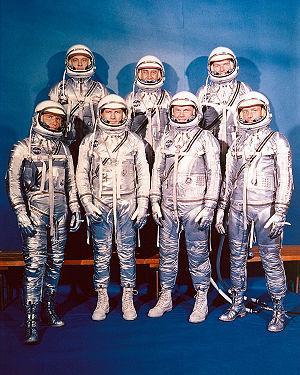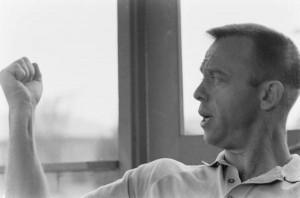50th anniversary of Alan Shepard, and America, in space

Image via Wikipedia
In advance of the anniversary of the day Alan Shepard became America's first spaceman (5/5/61), I'm posting Light This Candle excerpts this week, along with photos and links related to Shepard and the book. Here's a sample from Chapter 9, "We made them heroes, the first day they were picked"
One day in January of 1959, Shepard was reading the New York Times and came across an article about a new space agency that had been created a month earlier.
The political hysteria that had followed Sputnik resulted in the creation of an umbrella organization for the nation's best scientists and engineers: the National Aeronautics and Space Administration (NASA), a government-funded civilian agency whose primary goal would be to regain lost ground in the Cold War, prove to the world that Sputnik was a fluke, and beat the Russians into outer space. NASA absorbed a number of scientific agencies, including the National Advisory Committee for Aeronautics, which had been a driving force behind many of the rocket-powered Mach 2 and Mach 3 jet flights of the 1950s. Rocket scientists and their visions of launching missiles into space had been commandeered as soldier in the Cold War, and instead of sending satellites aloft, their new mission would be to send an American man. NASA was unveiled on December, 17, 1958 – the anniversary of the Wright brothers' first flight.
In the Times, Shepard read that NASA planned to invite 110 of the military's top test pilots to volunteer for a special mission – to become what NASA chose to call an "astronaut," which is Greek for "space sailor." Shepard read how, after ruling out daredevils and acrobats, race car drivers and mountaineers, NASA had decided it wanted steely, technology-savvy test pilots – who were also optimal choices because they happened to be on the government payroll. The candidates had to be shorter than five-foot-eleven (so they could fit into the tiny space capsule NASA was designing) and between 25 and 40 years old – NASA wanted mature pilots who'd been around, been tested and stuck it out. "Not," said an Air Force doctor who would help choose the astronauts, "those who would be enamored of the project at the outset then lose interest when the luster became worn by very hard work."
Following his year of academia at the Naval War College in Rhode Island, Shepard had been transferred to the Navy's Atlantic Fleet headquarters in Norfolk, Virginia, where the family had relocated and where he now served as "aircraft readiness officer," working with the commander of the Navy's Atlantic Fleet. Though he was not currently a test pilot, Shepard figured his name would be near the top of NASA's list. But by Friday of that week, he'd heard through the grapevine and in the halls of his Norfolk office that many of his test pilot colleagues had received invitations to come to the Pentagon for a secret briefing. Where the hell was his invitation? If they're looking for test pilots, he thought, shouldn't they be asking the Navy's best test pilot? He left work that night, angry and a little chagrined, the start of what he'd later call a "miserable weekend." He'd joke years later that he went home and "kicked the dog, spanked the children. It was a terrible weekend. It really was."
Louise could tell her husband was in a funk, which was rare for him. So, when he asked her what she thought of the whole astronaut thing, she tried to be upbeat. "How would you feel if I was one of the 110?" he asked. "It doesn't really matter because you're not," she said. "But if you were, I'd say, 'Just go right ahead.' I think it sounds wonderful."
Then, first thing Monday morning, a young staffer came up to Shepard and handed him an envelope. Inside was NASA's invitation. It had arrived the previous week. "Somehow it got misplaced," the sheepish young officer said, and Shepard didn't know whether to punch him or promote him.
He rushed home for lunch to tell Louise, who knew before he opened his mouth because Shepard was beaming from ear to ear. That night, he and Louise had a long talk about what this meant, for him and for the family. And he asked her what they should do if he actually got selected. "Why are you asking me?" she said. "You know you'll do it anyway."





